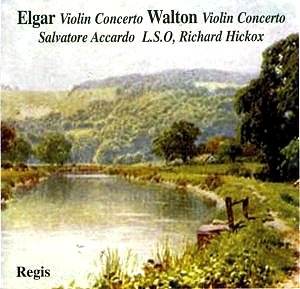In some quarters this recording, when first
issued by Collins, received a dusty reception. The detail escapes
me now but at the time of the discís appearance I remembered a
white hot BBC broadcast of the Elgar in which Accardo was joined
by the Boston Symphony conducted by Colin Davis. That broadcast
was in the mid-1970s while Davis's name was still tightly entwined
with the Bostonians and his lacklustre Sibelius symphony cycle
was still fresh on the scene - though lauded to the skies.
I did not associate Accardo with these concertos.
Linking him with the six Paganinis which he recorded complete
for DG in 1974, I did not rush to buy the Collins CD. Although
we have lost Davis for this recording Hickox punches well above
his weight. He has sometimes given the impression of production-line
routine as in his Prokofiev War and Peace (Chandos). In
this case all such fears can be stilled. Here he presses forward,
balances orchestral detail wisely and shrewdly focuses aggression,
accentuation and emphasis. In fact the orchestral contribution
in both concertos is spot-on with Hickox on his toes, drawing
surprisingly burly playing from the LSO in the belligerent moments
and no want of poetry in the reflective pages.
On top of these qualities, James Mallinson and
John Timperley did a supreme job with the technical side; witness
the lush yet carefully etched sound of the horns at once mellow
and imperious (7.19-7.21, 18.01 tr. 3) in the closing measures
of the Elgar. Accardo convinces you that here is a big statement
although his tone inclines towards slender grace rather than being
juicily voluptuous. Haendel's (flawed with Boult on Testament,
better on BBC IMP with Pritchard) or Sammons' (Naxos again) versions
are more extrovert and fruity. Unlike Heifetz (with Sargent on
an unmissable Naxos Historical) Accardo's note-group definition
is not breathtakingly faultless. This is nevertheless an exemplary
recording which any open-minded Elgarian prepared to countenance
a reading from someone other than Menuhin should hear.
The Walton is pressed hard and is delightful
both in sultry poetry as in brilliance. That very poetry is attested
by Accardo's superbly pointed way with the little chaffing figure
in the first movement at 4.43 and the succulent upwards slide
at 4.33 in the finale.
These are fallible or at least highly idiosyncratic
moments in Accardo's hands but my suggestion is that you disregard
the naysayers and enjoy this generous budget price issue alongside
Heifetz's Elgar/Walton (Naxos, budget price). For the Elgar, Zukerman
(Sony) is excellent in modern sound as is Sammons' vintage recording
(very special interpretative qualities override the neanderthal
sonics) and Dong Suk Kang also on Naxos. A first choice for the
Walton in modern sound would be either Kang on Naxos or Haendel
on EMI Classics although I also like Joshua Bell on Decca.
Rob Barnett

